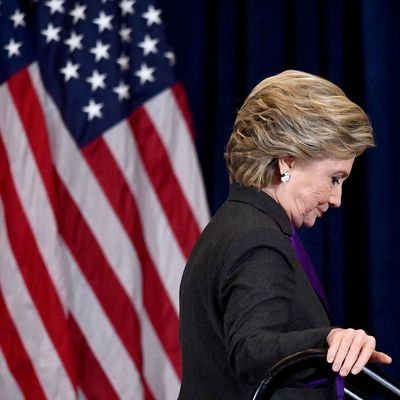
Back in July, I sent an email to some friends — all women — inviting them over to watch Hillary Clinton’s acceptance of the Democratic nomination. The subject line was “Let’s feminist ugly-cry together.” I said I wanted to celebrate the fact that a woman had made it this far in American politics. Really, though, I was hedging my bets. I wanted one big celebratory moment with the women I love, just in case Hillary didn’t get to give another major acceptance speech. I got a little choked up, but didn’t shed a tear.
This morning, I ugly-cried.
“Our campaign was never about one person or one election,” Clinton said in her concession speech. “It was about the country we love and about building an America that is hopeful, inclusive, and bighearted.”
It’s hard to get to a place of hope and inclusiveness when your eyes are still puffy and snot is still running down your face and you’re worried about the mental health and safety of your friends. A KKK-endorsed man who openly bragged about assaulting women has risen to power by stoking rural, white Americans’ fears, and, come January, every branch of the federal government will belong to him and his allies. “This election,” wrote Rebecca Traister last year, “is a referendum on the existence and civic participation of Americans who are not white men.” And now we all know how it went.
I would love to be turning my tears into a rant about men’s inability to accept powerful women. And there was a fair bit of that happening in this election, I’m sure. But that is not the full story the polling tells. White women were right alongside white men in voting for Trump: Exit polls are showing that 53 percent of white women voted for him, too.
“Too many privileged white women wanted a traditional regime to flourish,” Clover Hope writes at Jezebel. “And many liberal white men and women who didn’t think this could happen were happy to stand by and let the seismic shift toward white nationalism roll on, content to remain unaffected.”
We are about to enter a frightening new era for vulnerable people in America. Most of them cannot take a few days off to process what has just happened. Which is why those of us who don’t belong to the most vulnerable groups have a greater responsibility to start building that more “inclusive and bighearted” America right now. I’m sorry to inform you that we cannot take much time off.
This is especially true for white people who worried about a possible Trump presidency but didn’t do much to prevent it and are now devastated by the result. If you obsessively checked Facebook and FiveThirtyEight but didn’t phone-bank, didn’t write personal letters to Trump-leaning relatives, didn’t drive people to the polls, didn’t donate, didn’t make sure that every single one of your friends was registered … I wish you’d done things differently. But we can’t go back and redo the election. We can, however, start putting in some good work right now.
You can become an abortion-clinic escort. You can show up to a Movement for Black Lives event. You can actually start paying attention to your local and state government. You can volunteer with an after-school tutoring program. You can become a consistent donor to an organization that’s been doing social-change work for a long time — long before you despaired about these election results and decided to really get serious about improving the country. Use the buddy system and recruit three despondent friends to do one or two of these things with you. And then actually do them.
You’ll know that you are taking meaningful action when you start feeling uncomfortable. When you are nervous and a little scared. When you’re working with people who don’t look like you, or who have had very different experiences in this world. When you don’t have a tangible, immediate goal like “winning an election.” Because the hard work of making change in America is very different from electing a president. Elections have endpoints. Social progress does not.
More narrowly, when it comes to women and politics and the proverbial glass ceiling, it’s also up to everyone to fill the pipeline. Encourage women to run. Find politicians who look like the America you know and love, and support them early in their careers. “I know we have still not shattered that highest and hardest glass ceiling,” Clinton said in her concession speech, “but someday, someone will.” That’s a little too vague for my liking. I want a list of names and a line of donors, not a wistful “someday, someone” dream. This should be everyone’s responsibility. Don’t wear a “The Future Is Female” shirt if you can’t name three female politicians you’d like to see hold higher office in the future.
And if none of that works to stop your Claire Danes ugly-crying, here’s a secret: Hillary was always a beginning and never an endpoint. She is not our last chance at a woman president, and she was never our only path to meaningful change or feminist progress. President Hillary — even with a Democratic Senate — wouldn’t have been able to put a hard stop on the entrenched racism that leads to state violence against black people, or the male entitlement that leads to the abuse and assault of women. Things are going to be, uh, different without her in the White House (sorry, understatement of the decade), but our fundamental task is unchanged. The call to action is the same, but so much louder.
So listen to it.

